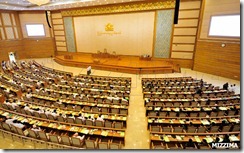As Burma’s spring by-elections draw closer, thoughts are beginning to turn to issues of process, particularly the prospect of international monitors, raised by the USA.
There is a clear necessity for the presence of such monitors when election day rolls around on April 1st. Burma’s 2010 election was riddled with irregularities and 
International monitors may be able to dissuade the government from such underhanded tactics during the polling itself, particularly as they would offer a valuable opportunity for President Thein Sein to demonstrate just how far his reform programme has come. A credible and positive report of official conduct could even lead to international sanctions being eased- a key priority for the President and his Union Solidarity and Development Party (USDP). It would be in their interests therefore, not only to let monitors in, but to present them with genuinely fair by-elections.
Before the voting is even reached however, the focus will be on this year’s national budget; an issue highlighted by Burma Campaign UK as presently even more important.
The initial budget laid out by the Minister of Finance and Revenue is, like so much in Burma at the moment, a small but positive sign of progress. The proportion of the state’s finances spent on the military has been reduced from 23.6% to 14.4% – a moderate decrease that may potentially be indicative of Thein Sein’s independence from the senior generals lurking in the background. Encouragingly, it could also suggest a forthcoming reduction in the on-going military offences against ethnic minority groups.
Meanwhile, the allocation of funds to health and education has increased from 5.4%  to 7.5% –a tiny and ultimately inadequate step, but one in the right direction nevertheless. Budget discussions in the Parliament over the coming weeks will give a clearer indication of whether the ruling USDP genuinely plans to seize what the International Monetary Fund has described as an “historic opportunity to redefine national spending” once and for all.
to 7.5% –a tiny and ultimately inadequate step, but one in the right direction nevertheless. Budget discussions in the Parliament over the coming weeks will give a clearer indication of whether the ruling USDP genuinely plans to seize what the International Monetary Fund has described as an “historic opportunity to redefine national spending” once and for all.
An open and productive budget debate, followed by an invitation for international monitors to observe the by-elections would reaffirm the government’s path towards further liberalisation. For once- it may not be too much to hope for.



No comments:
Post a Comment